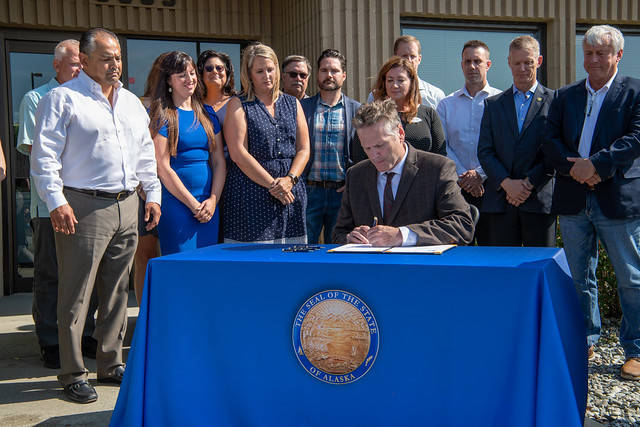Gov. Mike Dunleavy signed Senate Bill 2002 into law Thursday afternoon during a press conference at the offices of the Associated General Contractors of Alaska in Anchorage.
According to a press release from the governor’s office, the bill, “properly captures nearly $1 billion in federal transportation and infrastructure funding, provides necessary resources to enact public safety legislation, and reinstates funding for various programs such as the Alaska Performance Scholarship, WWAMI and Power Cost Equalization.”
While the bill does provide funding for a number of state programs, the governor vetoed $34,732,800 in total from the appropriations made in the bill.
Among the items vetoed were $10 million for statewide addiction treatment facilities, $500,000 for emergency medical services for Code Blue Project — the program meant to provide medical equipment for rural areas — and $1 million for public and community transportation.
Dunleavy said at the signing that he knew that cuts would be difficult for many groups in Alaska, but he was determined to put the state on a path of fiscal sustainability. Pretending the state was not running a budget deficit was doing harm to the state, he said.
Dunleavy made reference to the decrease in the price of oil that has taken place over the past several years and said without that revenue the state was no longer able to spend in the way it had in the past.
He said that, “the intent of the vetoes was not to harm Alaskans, nothing could be further from the truth.”
Dunleavy said part of his intent with the vetoes was to force a difficult but necessary conversation about the state’s fiscal future.
Dunleavy said that when he ran for governor he meant to, “restore and protect the PFD, promote public safety, and put the state on a plan for fiscal sustainability.”
In addition to signing this bill, the governor said his administration will be taking action that will impact a large number of Alaskans in the near future. This was mostly likely a reference to HB 2001, the other bill before the governor, which contains additional funding and an Alaska Permanent Fund dividend.
However, HB 2001 allocated only $1,600 for the PFD, which Dunleavy has publicly opposed.
It is possible that the Legislature could call itself into yet another special session with a two-thirds (40 votes) and attempt to override the governor’s vetoes.
On Twitter, some legislators responded to the governor’s vetoes within minutes of the announcement. The $10 million in cuts to addiction treatment facilities got specific attention.
The Governors vetos in SB 2002 strike programs critical for healthy and safe AK! https://t.co/whqlid5Caf— Rep. Sara Hannan (@RepSaraHannan) August 8, 2019
Reps. Sara Hannan, D-Juneau, and Ivy Sponholz, D-Anchorage, both expressed dismay at the announcement.
In a July 31 letter to the governor, Senate President Cathy Giessel, R-Anchorage, and House Speaker Bryce Edgmon, I-Dillingham, suggested that the governor call yet another special session. It is unclear if there will be another session.
If a special session is called, the Legislature will have five days from when it gavels in to override the vetoes.
The Legislature does not have a time line to call itself into special session. If no special session is called, the five day clock will begin at the start of the regular session in January.
• Contact reporter Peter Segall at 523-2228 or psegall@juneauempire.com.

